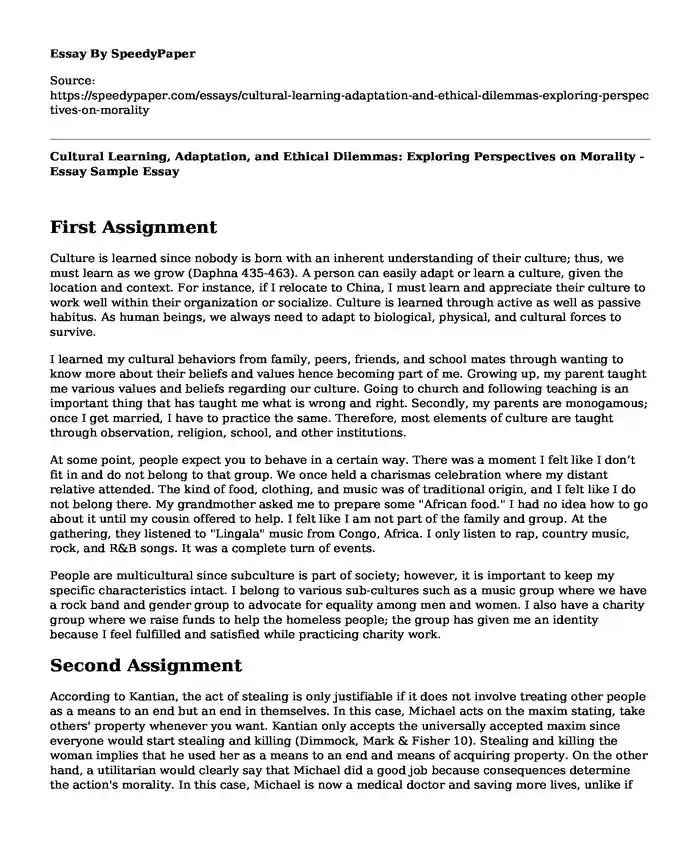
| Type of paper: | Essay |
| Categories: | Culture Ethics Ethical dilemma Moral development |
| Pages: | 3 |
| Wordcount: | 750 words |
First Assignment
Culture is learned since nobody is born with an inherent understanding of their culture; thus, we must learn as we grow (Daphna 435-463). A person can easily adapt or learn a culture, given the location and context. For instance, if I relocate to China, I must learn and appreciate their culture to work well within their organization or socialize. Culture is learned through active as well as passive habitus. As human beings, we always need to adapt to biological, physical, and cultural forces to survive.
I learned my cultural behaviors from family, peers, friends, and school mates through wanting to know more about their beliefs and values hence becoming part of me. Growing up, my parent taught me various values and beliefs regarding our culture. Going to church and following teaching is an important thing that has taught me what is wrong and right. Secondly, my parents are monogamous; once I get married, I have to practice the same. Therefore, most elements of culture are taught through observation, religion, school, and other institutions.
At some point, people expect you to behave in a certain way. There was a moment I felt like I don’t fit in and do not belong to that group. We once held a charismas celebration where my distant relative attended. The kind of food, clothing, and music was of traditional origin, and I felt like I do not belong there. My grandmother asked me to prepare some "African food." I had no idea how to go about it until my cousin offered to help. I felt like I am not part of the family and group. At the gathering, they listened to "Lingala" music from Congo, Africa. I only listen to rap, country music, rock, and R&B songs. It was a complete turn of events.
People are multicultural since subculture is part of society; however, it is important to keep my specific characteristics intact. I belong to various sub-cultures such as a music group where we have a rock band and gender group to advocate for equality among men and women. I also have a charity group where we raise funds to help the homeless people; the group has given me an identity because I feel fulfilled and satisfied while practicing charity work.
Second Assignment
According to Kantian, the act of stealing is only justifiable if it does not involve treating other people as a means to an end but an end in themselves. In this case, Michael acts on the maxim stating, take others' property whenever you want. Kantian only accepts the universally accepted maxim since everyone would start stealing and killing (Dimmock, Mark & Fisher 10). Stealing and killing the woman implies that he used her as a means to an end and means of acquiring property. On the other hand, a utilitarian would clearly say that Michael did a good job because consequences determine the action's morality. In this case, Michael is now a medical doctor and saving more lives, unlike if he could not have become a genius doctor.
The action of Kathy and Hopkins has a moral dilemma. Kathy has little to donate, but does it out of good heart, unlike Hopkins, a billionaire but only helps for personal gain. People will see Hopkins as the most generous being since his donation is big; this is sickening. Kathy has a big heart and compassion for helping. She has the best interest for the orphans; however, her donation will not be recognized. It is an ethical dilemma since Kathy's donation would not be recognized, and Hopkins will be applauded.
The case of the trolley driver is unique. It is an ethical issue because all these people deserve to live until they die of natural death. No one is supposed to rule out who is to die or not. However, given the consequential theory, he could have killed the two older adults. Unlike killing the five young fellows or a big man in front, I would determine who is more productive and have a more life span. Unlike the young fellow and the productive big man who has a lot to offer to society, the older people have lived their lives.
Work Cited
Dimmock, Mark, and Andrew Fisher. Ethics for A-level. Open Book Publishers, 2017. books.openedition.org/obp/4431?lang=en#tocfrom1n3
Oyserman, Daphna. "Culture in three ways: Culture and subcultures within countries." Annual review of psychology 68 (2017): 435-463. https://www.annualreviews.org/doi/abs/10.1146/annurev-psych-122414-033617
Cite this page
Cultural Learning, Adaptation, and Ethical Dilemmas: Exploring Perspectives on Morality - Essay Sample. (2023, Dec 25). Retrieved from https://speedypaper.com/essays/cultural-learning-adaptation-and-ethical-dilemmas-exploring-perspectives-on-morality
Request Removal
If you are the original author of this essay and no longer wish to have it published on the SpeedyPaper website, please click below to request its removal:
- Role of Teachers in Ell Assessments - Free Essay Example
- Essay Sample on Bee Communication
- Culturally Diverse Classrooms. Paper Example
- Essay Sample on Analysis of "What About Bob"
- Free Essay - Review Questions on Supplier Selection
- Corporate Social Responsibility and Organizational Psychology - Free Paper Sample
- Paper Sample on Childcare Dynamics: Navigating Development, Work, and Challenges
Popular categories




